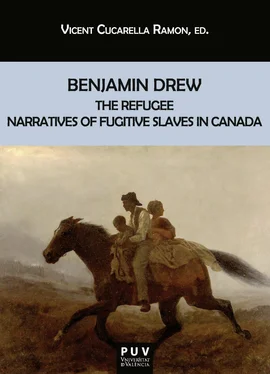These and similar questions can be most satisfactorily answered by the refugees themselves.
The history of their sufferings and their wrongs, of their bondage and their escape, may excite in some heart hitherto unmoved a glow of sympathy for our colored brother, yet fraudulently deprived of his birthright,–it may furnish the true friends of our country,–the friends of liberty and equal rights,–additional means toward overthrowing the slave power; that scandalous aristocracy which has hitherto been allowed to a great extent to sway the destinies of our nation.
The opinions and views of those who have been held in bondage in the United States may enable us to obtain a clearer insight into the nature of American slavery,–may prompt us to perform more energetically than hitherto, our duties to the oppressor and the oppressed,–to the North and to the South,–to the national government, and to the State in which we dwell.
The writer of these pages intends to visit those Americans who have fled from the North and the South into Upper Canada to escape the oppression exercised upon them by their native countrymen. He will assure them that they have the sympathies of many friends in the United States, and advise them that their good conduct and success in life may have an important bearing on the destinies of millions of their brethren, colored and white, in this country, who have the misfortune to be descended from slave mothers. He will endeavor to collect, with a view to placing their testimony on record, their experiences of the actual workings of slavery–what experience they have had of the condition of liberty–and such statements generally as they may be inclined to make, bearing upon the weighty subjects of oppression and freedom.
Objections may be urged to the testimony of the refugees on the score of their ignorance. We may naturally expect errors and mistakes in regard to dates, ages, proceedings at law, and other matters to know which would require an amount of information not vouchsafed to American slaves. But errors of this sort are of secondary consequence, and should rather be imputed to those who have from interest or necessity (the tyrant’s plea) placed their candle under a bushel, that it might not give light to all who were in their house. With this qualification there appears to be no reason why the statements of the colored Canadians should not be received as readily as any human testimony whatever.
If verbal alterations are required care will be taken to preserve the meaning: and if any portion of a narrative is found to trench upon affairs having no connection with slavery, or is likely to involve any good Samaritan in trouble, it will receive no other attention from the writer than to be studiously omitted.
And now we will make the best of our way to Canada. From that point let us survey the institution which entails many “domestic evils deplored by the whites,”–which “impoverishes a State,”–“stays the development of its natural resources,”–is “a great curse”–“a blot on our holy religion,”–“a curse in all its relations of master and servant,” exerting a “bad influence,” says a slaveholder, “upon our passions, upon our children, destroying that sense of moral responsibility which ought to bear upon us:” and let us indulge a hope that the cause of emancipation may receive a new impulse from a NORTH-SIDE VIEW OF SLAVERY.
Конец ознакомительного фрагмента.
Текст предоставлен ООО «ЛитРес».
Прочитайте эту книгу целиком, купив полную легальную версию на ЛитРес.
Безопасно оплатить книгу можно банковской картой Visa, MasterCard, Maestro, со счета мобильного телефона, с платежного терминала, в салоне МТС или Связной, через PayPal, WebMoney, Яндекс.Деньги, QIWI Кошелек, бонусными картами или другим удобным Вам способом.











![Benjamin Franklin - Memoirs of Benjamin Franklin; Written by Himself. [Vol. 2 of 2]](/books/747975/benjamin-franklin-memoirs-of-benjamin-franklin-wr-thumb.webp)
![Benjamin Franklin - Memoirs of Benjamin Franklin; Written by Himself. [Vol. 1 of 2]](/books/748053/benjamin-franklin-memoirs-of-benjamin-franklin-wr-thumb.webp)